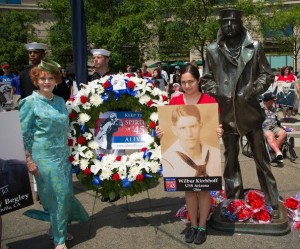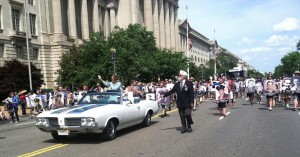Days Not Forgotten December, 1944
Wilbur (Web) Halvorsen
6th Armored Division
50th Armored Infantry Battalion
Company A
[The story in the February’ issue by Benjamin A. Goodin, “Time on Target, ” Les Bois Jacques, Bastogne was of great interest to me.] I had tied in with the l0lst Airborne Division. At that time we were spread out mighty thin. We lost more than half the men in our company, including all of our officers. First Sergeant Remmer was acting company commander. All the men in the outfit were being pushed to the limit. We were cold, tired and hungry. For eight days, our half-track with our sleeping bags couldn’t reach us forcing us to take shelter at night in a snowdrift. If we were lucky, we could find a deep dug German foxhole with logs over the top.
While we held this line I could hear German activity in the wooded area 400 yards out in front. The sound of tank engines turning over increased as the day wore on. We sent the word back and hoped for some TD help, but nothing happened. I made the rounds of the men as they huddled in their slit trenches, encouraging them to move to induce some circulation, or at least to work their feet against the side of the trench to keep them from freezing. Many developed frozen feet. I kept a pair of socks in my helmet liner, and changed whenever I had the opportunity. I saw men with frozen feet. It was terrible. We were told to hold the line at all costs, so we waited it out. Night came. We were exhausted, and tension kept building up, knowing that we could be hit at any moment, surely at daybreak.
At night the Germans sent up flares that turned the darkness to day. Artillery fire was heard off and on. Each time we knew the attack was on, but nothing happened. I was one of the few left of those who disembarked from the LST’s at Utah Beach, so I had some battle experience. Some of the new replacements were only there a few days. I can remember to this moment the look of fear and anxiety in their eyes. A young replacement that I put on guard duty could stand it no longer. Thinking he would be sent to the rear, he shot at the tip of his finger. The rifle blast and velocity took most of three fingers. So it was as we waited it out.
Sergeant Remmer came by with orders for everybody to stay put in their holes. He had heard that something was afoot, and would let me know. It wasn’t long in coming. The sound of artillery firing behind us was something I never will forget. The shells from the 105’s and 155’s kept coming and coming, whistling over our heads. I thought it would never stop and it was like music to our ears. All were on target to the wooded area in front of us. No one could survive the intensity of the blasts. That TOT that Benjamin Goodin wrote about saved the day for us. We were lucky.
Shortly after, a patrol was sent to view the damage. 1 am happy to this day I wasn’t on that patrol. The slaughter was indescribable. It was a massacre, littered with broken bodies and random wreckage. Many bodies were hanging from tree branches. It was utter and absolute devastation. Those still living would have minds shattered beyond repair. Men returning from the patrol were speechless. They were sick; I felt sorry for them.
The following incident happened a few days later. The Germans were still probing for an opening along the entire front. We found ourselves again on line at the edge of a wooded area. The Germans had their tanks lined up opposite us. We could see them, through the trees in the woods across from us. I saw one of our own tanks lined up with them. Sergeant Remmer sent back for firing power but it wasn’t promising, so we just waited. Then something very strange happened. A G1 came running out of the woods from the German side, waving his arms in desperation, telling us that we should get out of there as we didn’t have a chance. He said that he was released by the Germans to warn us to move out or we would be annihilated.
His uniform was a mess. He wore no helmet, and his hair was down in front of his face. He spoke good English, and loud enough for every one to hear. Some of our new men did make steps to the rear before they were halted. It didn’t take long for me to figure it out. After calming him down, I backed him against a tree and started asking him questions for him to admit he was German. I sent him to the rear, but not before a couple of our men ordered him to exchange uniforms with a dead German. He was correct in saying that we were about to be attacked.
It wasn’t long before a Tiger tank came moving slowly across the frozen ground in our direction. We had only our Ml rifles. It was strange that only one tank came forward. But, one or ten were at its mercy. However, the good Lord was with us. From the rear we heard a tank destroyer, crashing through the pine trees, dashing in front of us. It stopped, whirled, and fired at the Tiger. He then pulled back after one shot and repeated the operation down the line. The tank with its heavy armor wasn’t knocked out. It went into reverse and made it back to where it started. The attack was called off. After dark we pulled back to a better defensive position. It didn’t allow us any rest or ease the tension.
The next day we were again on the attack.


